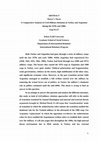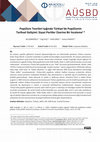Dissertations by Ezgi Elci

Both Turkey and Argentina had gone through a series of military coups until the late 1970s and ea... more Both Turkey and Argentina had gone through a series of military coups until the late 1970s and early 1980s. While Argentina had experienced five (1930, 1943, 1955, 1962, 1966), Turkey had lived through two (1960 and 1971) military coups. The factors that caused the 1976 coup in Argentina and 1980 coup in Turkey were quite similar: Political polarization and fragmentation, weak governments, violence on the streets, high mobilization of the labor class, and significant economic crises. However, in the post transition period while Argentina managed to establish a full civilian control over the military by removing the armed forces out of politics, in Turkey the military’s dominant role in politics continued until the mid-2000s. This thesis is trying to find an answer to this question.
In an attempt to answer this question and analyze the different outcomes, this study as tools of civil-military relations approaches will refer to the modes of transition examined by Samuel Huntington and internal and external threats arguments brought by Michael Desch. It will argue that ‘transformation’ mode of transition in which the authoritarian rulers initiate the transition enabled the dominant role for the Turkish military in the aftermath of the 1980 coup. For Argentina ‘replacement’ in which the opposition overthrows the authoritarian rulers by force enabled the Argentinean civilian rulers to establish their control over the military. It will also argue that throughout the 1980s, the high internal threat environment due to PKK attacks in Turkey and low external environment as a result of end of Cold War disabled the civilian control of the military. However, in Argentina during the same period low internal threat environment vis-à-vis the high external threat due to Malvinas/Falkland war promoted the establishment of the civilian control over the military.
Papers by Ezgi Elci
Research Handbook of Authoritarianism, 2024
This chapter discusses authoritarian populism. Specifically, the chapter argues that populism is ... more This chapter discusses authoritarian populism. Specifically, the chapter argues that populism is incompatible with the institutions of liberal democracy, such as the rule of law, checks and balances, and minority rights. Especially when populists come to power with majorities, they capture or weaken these institutions in the name of people’s sovereignty. Hence, we see the effects of populist conquest of the state with the surveys that measure the level of democracy as a decreasing trend.

AÜSBD, 2022
Bu çalışma, popülist eğilimlerin Osmanlı İmparatorluğu'nun son döneminden günümüz Türkiye siyaset... more Bu çalışma, popülist eğilimlerin Osmanlı İmparatorluğu'nun son döneminden günümüz Türkiye siyasetine kadar hangi liderler ve partiler tarafından ne şekilde benimsendiğini araştırmaktadır. Bu amaçla çalışmamızın kurgusu popülizmi zayıf-merkezli bir ideoloji olarak kabul etmektedir. Görgül zenginliğe olanak sağlayan bu tanımlamanın ışığında Türkiye'deki popülizmin tarihi millet (halk), elitler ve milli irade kavramları çerçevesinde irdelenmiştir. İncelememiz Türkiye'deki popülizmde üç ayrı "halk" kavramını gözlemlemektedir. Bunlar, solda 1970'ler Cumhuriyet Halk Partisi'nin benimsediği "sıradan insanlar;" merkez sağ partilerin 1950'lerden itibaren takip ettiği "milli irade" ile "halkın aklıselimi" ve sağda 1969 itibariyle Milli Görüş ideolojisinin benimsediği "İslam milleti" tanımlamalarıdır. Türkiye'deki popülizm, milletin (halkın) karşısına yerleştirilen elitlerin tanımına siyasal partilerin muhalefette-iktidarda olup olmamalarına ve ideolojik sağ-sol yönelimlerine göre farklılık göstermektedir. Yakın dönemde ise Adalet ve Kalkınma Partisi, Demokrat Parti ve Adalet Partisi çizgisini ve Milli Görüş'ün yaklaşımını harmanlayarak Türkiye popülizmine yeni bir kimlik kazandırmıştır. Bu bağlamda, milletin (halkın) karşısındaki elit tanımı iç siyasetteki dışlayıcı-otoriter yöneticilerden uluslararası siyasetteki dış düşmanlara ve onların iç siyasetteki işbirlikçilerine endekslenmiştir. Sonuçta, incelememiz Türkiye'deki popülist eğilimlerin siyasette sadece belli bir parti ve ideolojiye ait olmadığını tarihsel bir bütünlük içerisinde sunmaktadır. Bu teorik temelli tarihsel bütünlük aynı zamanda diğer nicel ve nitel vaka analizlerine de önemli bir kaynak sağlayacaktır. Millet (halk), elitler ve milli irade kavramlarının tarih içerisinde ve siyasal sağ-sol ideoloji yelpazesinin neredeyse her yerinde geçirmiş olduğu gelişimi ortaya koymanın diğer karşılaştırmalı çalışmalara da hem kuramsal hem de görgül katkılarda bulunacağını düşünmekteyiz.

IPSR
The rise of populism presents a challenge to liberal democracy in various countries. This article... more The rise of populism presents a challenge to liberal democracy in various countries. This article questions how populist attitudes affect the democratic preferences of the electorate. Using representative survey data fielded from Turkey in 2019, we first tested the effect of populist attitudes on illiberal democratic attitudes. The results show the negative impact of populism on support for illiberal democratic attitudes. Next, we analyzed which dimension of populism correlates with illiberal democratic preferences. Our results pointed to the negative influence of the Manichean outlook on preferences concerning democracy. Contrary to expectations, as anti-elitist and people-centric attitudes increase, support for illiberal democracy decreases. Hence, the relative emphasis on different dimensions of populism is likely to shape the net balance of its influence on democracy. Electoral alliance preferences also shape democracy preferences. The ruling People's Alliance voters are more supportive of illiberal democracy than the opposition blocs and parties.

2011’de Suriye İç Savaşı’nın başlamasıyla bugüne kadar Türkiye’ye göç eden 3 milyon 750 bin civar... more 2011’de Suriye İç Savaşı’nın başlamasıyla bugüne kadar Türkiye’ye göç eden 3 milyon 750 bin civarındaki mülteci ile birlikte Türkiye siyasetinde göçmenlere karşı tutumlar da araştırılmaya başlanmıştır. Önceki çalışmalar göçmenlere karşı tutumların çeşitli boyutlarını analiz etmiş olsa da bu tutumların parti tercihlerine etkisi diğer ülkelere kıyasla Türkiye’de daha az çalışılmış bir konudur.
Amaç: Bu çalışma 2018 yılında toplanan Comparative Study of Electoral Systems (2019) verisini kullanarak Türkiye’de göçmenlere karşı tutumların parti tercihine olan etkisini nicel yöntemler ile analiz etmektedir.
Yöntem: Göçmenlere karşı tutumların parti tercihine etkisi farklı lojistik regresyon modelleri ile yapılan analizlerle ölçülmüştür. Kontrol değişkenleri olarak Türkiye siyasetinde daha önceden çalışılmış dindarlık ve sol-sağ düzlemindeki konum gibi merkez-çevre teorisine dayanan ve ekonomik oy verme davranışını ölçen değişkenler ile demografik değişkenler kullanılmıştır.
Bulgular: Sonuçlar göstermektedir ki göçmenlere karşı olumsuz tutumlar arttıkça İyi Parti’ye oy verme olasılığı artarken, AK Parti’ye oy verme olasılığı azalmaktadır. Cumhuriyet Halk Partisi’ne oy verme tercihi ile göçmenlere karşı tutumlar arasında sadece demografik değişkenlerle kontrol edildiğinde olumlu bir ilişki varken, dindarlık ve seçmenin sol-sağ düzlemindeki konumu ile birlikte kontrol edildiğinde ise bu etki istatistiksel olarak anlamsızlaşmaktadır. Son olarak ekonomik değerlendirmeler de regresyona eklendiğinde göçmenlere karşı tutumların parti tercihine etkisi tüm modellerde istatistiksel olarak anlamsız hale gelmektedir.
Özgünlük: Veri setindeki diğer ülkeler ile kıyaslandığında Türkiye’de göçmenlere karşı olumsuz tutumlar oldukça yüksekken bu tutumların parti tercihini belirlemede zayıf kalması yanıtlanması önemli bir soru olarak ortaya çıkmaktadır.

The rise of populism presents a challenge to liberal democracy in various countries. This article... more The rise of populism presents a challenge to liberal democracy in various countries. This article questions how populist attitudes affect the democratic preferences of the electorate. Using representative survey data fielded from Turkey in 2019, we first tested the effect of populist attitudes on illiberal democratic attitudes. The results show the negative impact of populism on support for illiberal democratic attitudes. Next, we analyzed which dimension of populism correlates with illiberal democratic preferences. Our results pointed to the negative influence of the Manichean outlook on preferences concerning democracy. Contrary to expectations, as anti-elitist and people-centric attitudes increase, support for illiberal democracy decreases. Hence, the relative emphasis on different dimensions of populism is likely to shape the net balance of its influence on democracy. Electoral alliance preferences also shape democracy preferences. The ruling People's Alliance voters are more supportive of illiberal democracy than the opposition blocs and parties.

Bu çalışma, popülist eğilimlerin Osmanlı İmparatorluğu'nun son döneminden günümüz Türkiye siyaset... more Bu çalışma, popülist eğilimlerin Osmanlı İmparatorluğu'nun son döneminden günümüz Türkiye siyasetine kadar hangi liderler ve partiler tarafından ne şekilde benimsendiğini araştırmaktadır. Bu amaçla çalışmamızın kurgusu popülizmi zayıf-merkezli bir ideoloji olarak kabul etmektedir. Görgül zenginliğe olanak sağlayan bu tanımlamanın ışığında Türkiye'deki popülizmin tarihi millet (halk), elitler ve milli irade kavramları çerçevesinde irdelenmiştir. İncelememiz Türkiye'deki popülizmde üç ayrı "halk" kavramını gözlemlemektedir. Bunlar, solda 1970'ler Cumhuriyet Halk Partisi'nin benimsediği "sıradan insanlar;" merkez sağ partilerin 1950'lerden itibaren takip ettiği "milli irade" ile "halkın aklıselimi" ve sağda 1969 itibariyle Milli Görüş ideolojisinin benimsediği "İslam milleti" tanımlamalarıdır. Türkiye'deki popülizm, milletin (halkın) karşısına yerleştirilen elitlerin tanımına siyasal partilerin muhalefette-iktidarda olup olmamalarına ve ideolojik sağ-sol yönelimlerine göre farklılık göstermektedir. Yakın dönemde ise Adalet ve Kalkınma Partisi, Demokrat Parti ve Adalet Partisi çizgisini ve Milli Görüş'ün yaklaşımını harmanlayarak Türkiye popülizmine yeni bir kimlik kazandırmıştır. Bu bağlamda, milletin (halkın) karşısındaki elit tanımı iç siyasetteki dışlayıcı-otoriter yöneticilerden uluslararası siyasetteki dış düşmanlara ve onların iç siyasetteki işbirlikçilerine endekslenmiştir. Sonuçta, incelememiz Türkiye'deki popülist eğilimlerin siyasette sadece belli bir parti ve ideolojiye ait olmadığını tarihsel bir bütünlük içerisinde sunmaktadır. Bu teorik temelli tarihsel bütünlük aynı zamanda diğer nicel ve nitel vaka analizlerine de önemli bir kaynak sağlayacaktır. Millet (halk), elitler ve milli irade kavramlarının tarih içerisinde ve siyasal sağ-sol ideoloji yelpazesinin neredeyse her yerinde geçirmiş olduğu gelişimi ortaya koymanın diğer karşılaştırmalı çalışmalara da hem kuramsal hem de görgül katkılarda bulunacağını düşünmekteyiz.
National Identity and Social Cohesion, 2021

This article scrutinizes the relationship between collective nostalgia and populism. Different po... more This article scrutinizes the relationship between collective nostalgia and populism. Different populist figures utilize nostalgia by referring to their country's 'good old' glorious days and exploiting resentment of the elites and establishment. Populists instrumentalize nostalgia in order to create their populist heartland, which is a retrospectively constructed utopia based on an abandoned but undead past. Using two original datasets from Turkey, this study first analyzes whether collective nostalgia characterizes populist attitudes of the electorate. The results illustrate that collective nostalgia has a significantly positive relationship with populist attitudes even after controlling for various independent variables, including religiosity, partisan-ship, satisfaction with life and Euroscepticism. Secondly, the study tests whether nostalgic messages affect populist attitudes using an online survey experiment. The results indicate that Ottoman nostalgia helps increase populist attitudes. Kemalist nostalgia, however, has a weak direct effect on populist attitudes that disappears after controlling for party preference.

European Political Science Review, 2020
Discontent is seen as a critical driver for the appeal of populism, yet studies have typically fo... more Discontent is seen as a critical driver for the appeal of populism, yet studies have typically focused on cases of populism in opposition. We argue that scholars' emphasis on populism in opposition led them to overlook the roles of elite messages and partisanship in the adoption of populist attitudes. Drawing on theories of elite-driven public opinion, we contend that populist attitudes do not need to be rooted in discontent. In cases of populism in power, those who are more satisfied politically and economically, and partisans of the ruling party should display higher levels of populist attitudes. We provide observational and experimental survey evidence in this direction from Turkey, where a populist party has long been in power. We also find that the dominant characteristic of support for populism in power is an emphasis on popular sovereignty at the expense of institutions of horizontal accountability.

European Political Science Review, 2020
Discontent is seen as a critical driver for the appeal of populism, yet studies have typically fo... more Discontent is seen as a critical driver for the appeal of populism, yet studies have typically focused on cases of populism in opposition. We argue that scholars' emphasis on populism in opposition led them to overlook the roles of elite messages and partisanship in the adoption of populist attitudes. Drawing on theories of elite-driven public opinion, we contend that populist attitudes do not need to be rooted in discontent. In cases of populism in power, those who are more satisfied politically and economically, and partisans of the ruling party should display higher levels of populist attitudes. We provide observational and experimental survey evidence in this direction from Turkey, where a populist party has long been in power. We also find that the dominant characteristic of support for populism in power is an emphasis on popular sovereignty at the expense of institutions of horizontal accountability.
The Rise of Populism in Turkey: A Content Analysis, 2019
The rise of populist parties around the world raises concerns about
liberal democracy. Amid the d... more The rise of populist parties around the world raises concerns about
liberal democracy. Amid the discussions on democratic backsliding,
this study scrutinises populism in Turkey by using quantitative
content analysis. For this goal, this article uses parliamentary
group speeches of political leaders between 2011 and 2019
(N = 569) as raw data. The results illustrate that Erdoğan is significantly
more populist than other leaders. Kılıçdaroğlu, on the
other hand, appears as the least populist political figure. While
Bahçeli exploits a Manichean discourse, Peoples’ Democratic Party
(Halkların Demokratik Partisi (HDP)) instrumentalises anti-elitism.
The overall results indicate that Turkish politics is stuck in the
spiral of populism, which damages democracy in Turkey.
Populism around the World: A Comparative Perspective, 2019










Uploads
Dissertations by Ezgi Elci
In an attempt to answer this question and analyze the different outcomes, this study as tools of civil-military relations approaches will refer to the modes of transition examined by Samuel Huntington and internal and external threats arguments brought by Michael Desch. It will argue that ‘transformation’ mode of transition in which the authoritarian rulers initiate the transition enabled the dominant role for the Turkish military in the aftermath of the 1980 coup. For Argentina ‘replacement’ in which the opposition overthrows the authoritarian rulers by force enabled the Argentinean civilian rulers to establish their control over the military. It will also argue that throughout the 1980s, the high internal threat environment due to PKK attacks in Turkey and low external environment as a result of end of Cold War disabled the civilian control of the military. However, in Argentina during the same period low internal threat environment vis-à-vis the high external threat due to Malvinas/Falkland war promoted the establishment of the civilian control over the military.
Papers by Ezgi Elci
Amaç: Bu çalışma 2018 yılında toplanan Comparative Study of Electoral Systems (2019) verisini kullanarak Türkiye’de göçmenlere karşı tutumların parti tercihine olan etkisini nicel yöntemler ile analiz etmektedir.
Yöntem: Göçmenlere karşı tutumların parti tercihine etkisi farklı lojistik regresyon modelleri ile yapılan analizlerle ölçülmüştür. Kontrol değişkenleri olarak Türkiye siyasetinde daha önceden çalışılmış dindarlık ve sol-sağ düzlemindeki konum gibi merkez-çevre teorisine dayanan ve ekonomik oy verme davranışını ölçen değişkenler ile demografik değişkenler kullanılmıştır.
Bulgular: Sonuçlar göstermektedir ki göçmenlere karşı olumsuz tutumlar arttıkça İyi Parti’ye oy verme olasılığı artarken, AK Parti’ye oy verme olasılığı azalmaktadır. Cumhuriyet Halk Partisi’ne oy verme tercihi ile göçmenlere karşı tutumlar arasında sadece demografik değişkenlerle kontrol edildiğinde olumlu bir ilişki varken, dindarlık ve seçmenin sol-sağ düzlemindeki konumu ile birlikte kontrol edildiğinde ise bu etki istatistiksel olarak anlamsızlaşmaktadır. Son olarak ekonomik değerlendirmeler de regresyona eklendiğinde göçmenlere karşı tutumların parti tercihine etkisi tüm modellerde istatistiksel olarak anlamsız hale gelmektedir.
Özgünlük: Veri setindeki diğer ülkeler ile kıyaslandığında Türkiye’de göçmenlere karşı olumsuz tutumlar oldukça yüksekken bu tutumların parti tercihini belirlemede zayıf kalması yanıtlanması önemli bir soru olarak ortaya çıkmaktadır.
liberal democracy. Amid the discussions on democratic backsliding,
this study scrutinises populism in Turkey by using quantitative
content analysis. For this goal, this article uses parliamentary
group speeches of political leaders between 2011 and 2019
(N = 569) as raw data. The results illustrate that Erdoğan is significantly
more populist than other leaders. Kılıçdaroğlu, on the
other hand, appears as the least populist political figure. While
Bahçeli exploits a Manichean discourse, Peoples’ Democratic Party
(Halkların Demokratik Partisi (HDP)) instrumentalises anti-elitism.
The overall results indicate that Turkish politics is stuck in the
spiral of populism, which damages democracy in Turkey.
In an attempt to answer this question and analyze the different outcomes, this study as tools of civil-military relations approaches will refer to the modes of transition examined by Samuel Huntington and internal and external threats arguments brought by Michael Desch. It will argue that ‘transformation’ mode of transition in which the authoritarian rulers initiate the transition enabled the dominant role for the Turkish military in the aftermath of the 1980 coup. For Argentina ‘replacement’ in which the opposition overthrows the authoritarian rulers by force enabled the Argentinean civilian rulers to establish their control over the military. It will also argue that throughout the 1980s, the high internal threat environment due to PKK attacks in Turkey and low external environment as a result of end of Cold War disabled the civilian control of the military. However, in Argentina during the same period low internal threat environment vis-à-vis the high external threat due to Malvinas/Falkland war promoted the establishment of the civilian control over the military.
Amaç: Bu çalışma 2018 yılında toplanan Comparative Study of Electoral Systems (2019) verisini kullanarak Türkiye’de göçmenlere karşı tutumların parti tercihine olan etkisini nicel yöntemler ile analiz etmektedir.
Yöntem: Göçmenlere karşı tutumların parti tercihine etkisi farklı lojistik regresyon modelleri ile yapılan analizlerle ölçülmüştür. Kontrol değişkenleri olarak Türkiye siyasetinde daha önceden çalışılmış dindarlık ve sol-sağ düzlemindeki konum gibi merkez-çevre teorisine dayanan ve ekonomik oy verme davranışını ölçen değişkenler ile demografik değişkenler kullanılmıştır.
Bulgular: Sonuçlar göstermektedir ki göçmenlere karşı olumsuz tutumlar arttıkça İyi Parti’ye oy verme olasılığı artarken, AK Parti’ye oy verme olasılığı azalmaktadır. Cumhuriyet Halk Partisi’ne oy verme tercihi ile göçmenlere karşı tutumlar arasında sadece demografik değişkenlerle kontrol edildiğinde olumlu bir ilişki varken, dindarlık ve seçmenin sol-sağ düzlemindeki konumu ile birlikte kontrol edildiğinde ise bu etki istatistiksel olarak anlamsızlaşmaktadır. Son olarak ekonomik değerlendirmeler de regresyona eklendiğinde göçmenlere karşı tutumların parti tercihine etkisi tüm modellerde istatistiksel olarak anlamsız hale gelmektedir.
Özgünlük: Veri setindeki diğer ülkeler ile kıyaslandığında Türkiye’de göçmenlere karşı olumsuz tutumlar oldukça yüksekken bu tutumların parti tercihini belirlemede zayıf kalması yanıtlanması önemli bir soru olarak ortaya çıkmaktadır.
liberal democracy. Amid the discussions on democratic backsliding,
this study scrutinises populism in Turkey by using quantitative
content analysis. For this goal, this article uses parliamentary
group speeches of political leaders between 2011 and 2019
(N = 569) as raw data. The results illustrate that Erdoğan is significantly
more populist than other leaders. Kılıçdaroğlu, on the
other hand, appears as the least populist political figure. While
Bahçeli exploits a Manichean discourse, Peoples’ Democratic Party
(Halkların Demokratik Partisi (HDP)) instrumentalises anti-elitism.
The overall results indicate that Turkish politics is stuck in the
spiral of populism, which damages democracy in Turkey.